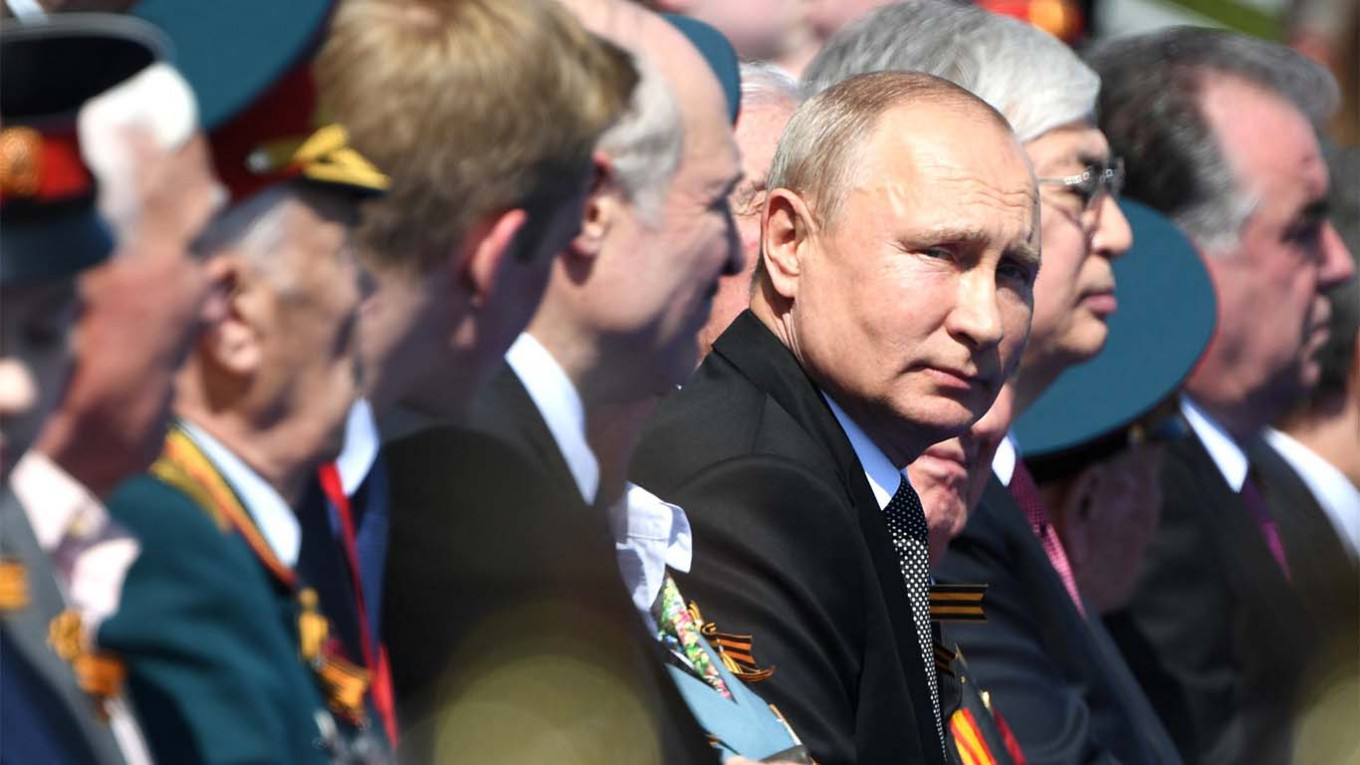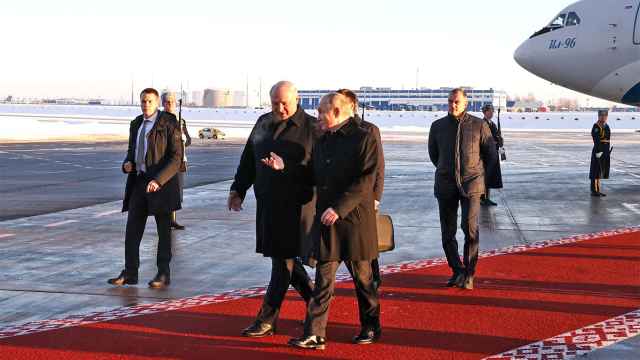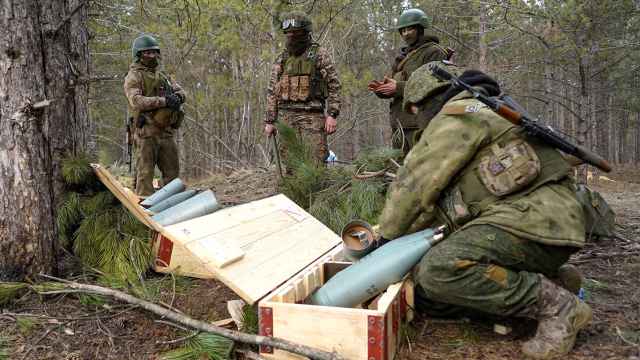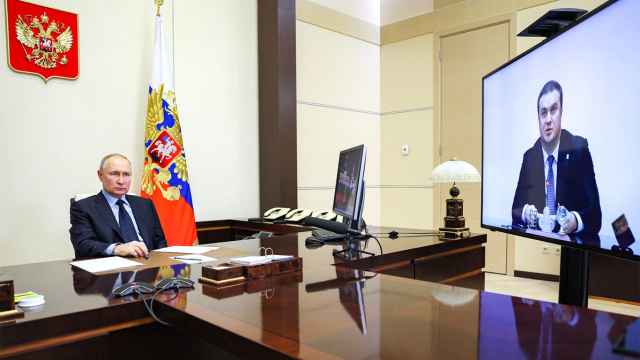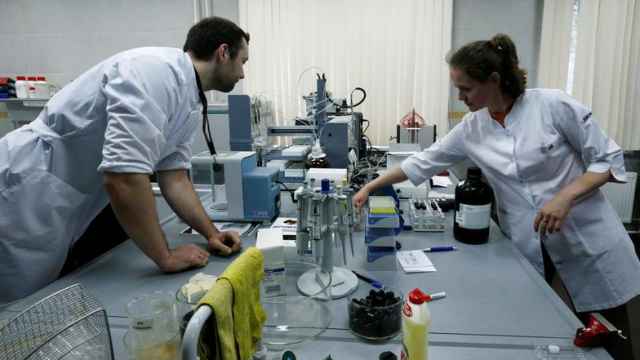There’s an acquired habit of reading between the lines of everything President Vladimir Putin writes or says. Given the subterfuge of Russian state power, it’s an understandable one. The Victory Day Parade, the plebiscite to approve constitutional changes in the middle of a pandemic — all these are ostentatious displays of autocratic decision-making by a Kremlin that nevertheless continues to insist on a “sovereign democracy” few bother to believe in anymore.
And yet, by reading only between the lines — and by automatically jumping to the most nefarious conclusions — we sometimes miss what the Russian leader is actually saying.
At the end of an interview aired this past weekend as part of a “documentary” that bore all the gloss and pathos of a campaign trail propaganda film, Putin said:
“You know, I’ll be absolutely sincere. If this doesn’t happen, in about two years, and I know this from personal experience, instead of normal… work on many levels of government [people] will start darting their eyes around in search of potential successors. People need to work, not look for successors.”
When asked by the interviewer if he’d made a decision about his future, he gave his classic response: No, he hadn’t. But he wasn’t ruling out the possibility of running for president. And then he smiled knowingly.
That smile was his signature invitation to read between the lines — to assume what we’ve already decided about him, that he isn’t going anywhere, and that actually he has already decided everything. Or maybe not.
The truth could be a lot closer to his literal words than we assume. There is a certain logic to creating the impression that he has already decided to run for president in 2024 while leaving the option to decide, as and when he pleases, whether he will actually run for president or allow a vetted successor to run for president while he keeps an eye on things from a nominally powerful position.
While some uncertainty helps keep people on their toes, too much can backfire. Putin knows from personal experience what happened in 2011.
Government elites and even Putin’s United Russia party spent much of that year guessing whether Putin would return to the presidency from the seat of prime minister, or allow his protégé, and placeholder, Dmitry Medvedev to run again.
Both Putin and Medvedev deflected the main question on everyone’s minds, dropping conflicting hints and engaging in foreign policy disagreements that were either carefully orchestrated or tell-tale signs of a deep rift, depending on which political expert’s take, or wishful thinking, happened to be in vogue.
The suspense ended when Putin and Medvedev announced in late September 2011 that they’d “decided long ago” that Putin would be returning to the presidency.
The liberal government elites that had backed Medvedev, the burgeoning middle class that had believed in Medvedev’s modernization campaign and his famous “freedom is better than not freedom” felt so manipulated and betrayed that they rebelled. Their discontent helped spark the Bolotnaya protests — the biggest anti-Kremlin demonstrations since the end of the Soviet Union.
In 2007, Putin had refused — despite requests — to change the Constitution to allow him to remain president.
The uncertainty back then that led up to the nomination of Medvedev as presidential candidate that year fueled an internecine war among security structures that resulted in a retreat of the siloviki hardliners.
Putin is a tactical operator with a penchant for quickly adapting to circumstances rather than planning strategically. He doesn’t tend to make decisions in advance, and if he does he often changes them. Insiders have described him as often making decisions at the last moment.
Despite what he said in 2011, his decision to return to the presidency appears to have been made — or at least cemented — that summer, not “years” before.
More recently still, Putin continued to deny plans to change the Constitution that would “reset” term limits right up until he proposed doing just that.
His initial proposed amendments in January focused more on creating options for him to continue ruling from another office, whether as prime minister or head of a new State Council. But the looming instability of the coronavirus crisis pushed him to change his mind in favor of a safer option of resetting term limits now instead of scrambling to find a legitimate way to remain president in 2024, if he so chooses.
The ability to maneuver, adapt, and change plans might have served Putin well in entrenching himself as the stable — or unchanging — leader of the country, but this indecision doesn’t bode well for the perception of stability.
If in the past Putin could afford to keep people guessing, with falling ratings and amid a global and domestic crisis, he can no longer do so.
The constitutional changes, then, have two purposes.
One, they create a sense of stability for Putin himself, by providing maneuvering space to choose from any number of options to remain in power, including the presidency, even if he hasn’t made a decision quite yet.
And two, by creating the impression that Putin wants to return to the presidency, they create a sense of stability for the government elites and avoid Putin being seen as a lame duck.
It remains to be seen, however, how much more of this kind of stability both the elites and the public are prepared to stomach. After all, there’s nothing so autocratic as smiling away decisions until you finally feel like making them, and manipulating your laws to validate taking your sweet time.
A Message from The Moscow Times:
Dear readers,
We are facing unprecedented challenges. Russia's Prosecutor General's Office has designated The Moscow Times as an "undesirable" organization, criminalizing our work and putting our staff at risk of prosecution. This follows our earlier unjust labeling as a "foreign agent."
These actions are direct attempts to silence independent journalism in Russia. The authorities claim our work "discredits the decisions of the Russian leadership." We see things differently: we strive to provide accurate, unbiased reporting on Russia.
We, the journalists of The Moscow Times, refuse to be silenced. But to continue our work, we need your help.
Your support, no matter how small, makes a world of difference. If you can, please support us monthly starting from just $2. It's quick to set up, and every contribution makes a significant impact.
By supporting The Moscow Times, you're defending open, independent journalism in the face of repression. Thank you for standing with us.
Remind me later.



